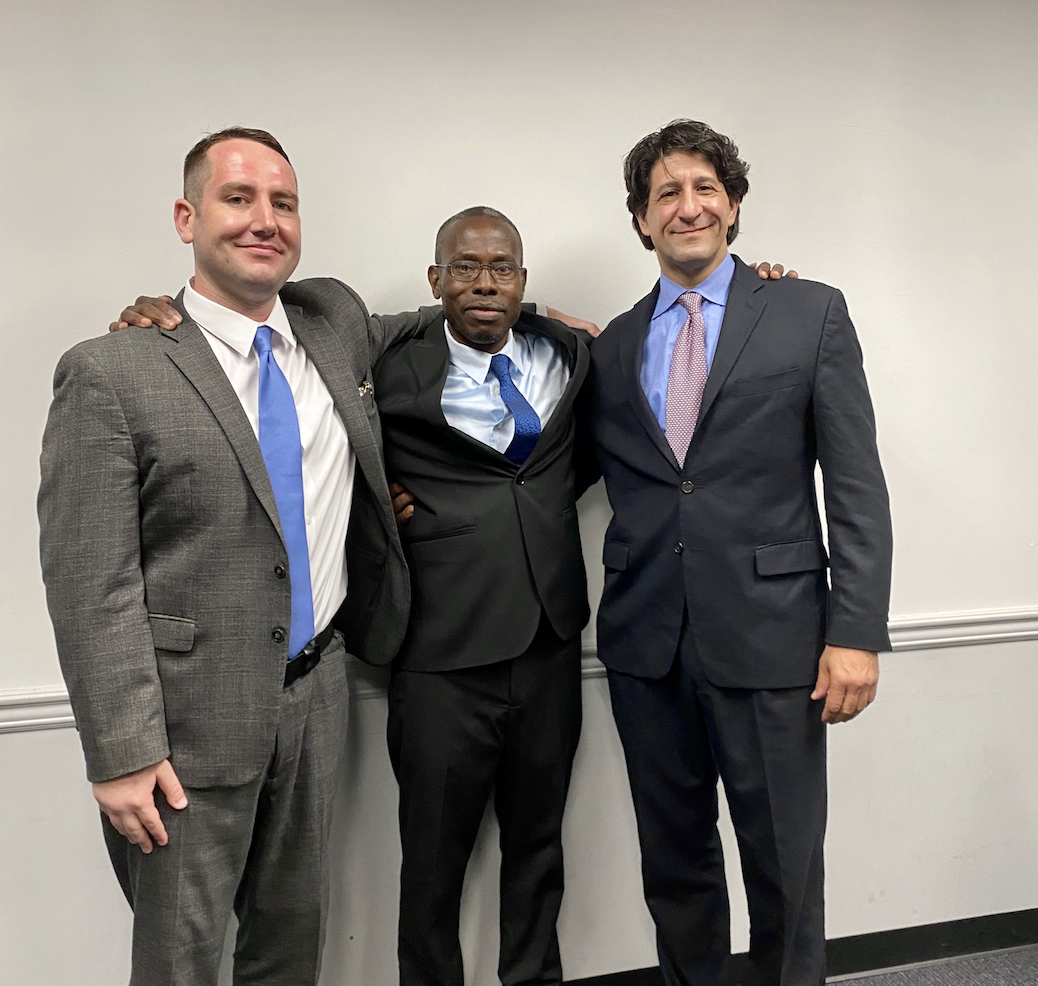Cambria Heights man freed 30 years after being wrongfully convicted
/Carlton Roman (center) with his attorney James Henning (left) and investigator Dan Levine (right) after a judge ruled Roman had been wrongfully convicted of murder in 1989. Photo via Henning
By Jacob Kaye
After spending over three decades in prison, a Cambria Heights man wrongfully convicted of murder walked free Monday after a judge ruled to vacate his conviction and dismiss his indictment.
Carlton Roman’s 1989 murder trial was marred by unreliable witnesses who pinned a fatal shooting on the recent college grad and friend of the victim, an investigation found.
Roman had his conviction overturned by acting Administrative Judge of the Queens Supreme Court Michelle Johnson on Aug. 9, after a joint motion was filed by Queens District Attorney Melinda Katz and James Henning, Roman’s attorney.
Roman’s case was reviewed by the DA’s Conviction Integrity Unit, which found new evidence that suggested that key witnesses in Roman’s case were unreliable. Had the inconsistencies behind their testimony been known to the jury at the time of Roman’s trial, he would have likely been acquitted, the DA said.
The new evidence includes information that one of the witnesses had motivation for the murder himself and that the other witness was allegedly a feared crime boss who had changed his telling of the shooting at least six times.
“I waited a long time to hear those words and when it finally happened, I was speechless,” Roman told the Eagle after the hearing. “To finally hear the judge say it and to know that finally, that this is it, is beyond words.”
Carlton Roman’s 1989 murder conviction was overturned Monday after the DA’s Conviction Integrity Unit uncovered facts about the original trial that would have likely led to his acquittal had the jury known at the time. Photo via Henning
On March 16, 1989, Lloyd Witter was fatally shot at Paul Anderson’s home in Jamaica. A second man, Jomo Kenyatta was also shot multiple times and suffered injuries as a result of the shooting that limited his mobility.
Police found Anderson tied up in his home next to Witter’s body but unharmed.
Both Anderson and Kenyatta later told police that Roman had carried out the shooting despite a complete lack of DNA or fingerprint evidence linking him to the scene and an alibi, according to the DA.
Roman was convicted and sentenced to 43 and 1/3 years in prison based on Anderson and Kenyatta’s testimony.
A Queensborough Community College graduate, Roman had no criminal record and maintained his innocence from the time of his arrest until the ultimate ruling that he was wrongly convicted.
Roman asked the Queens DA’s office to re-investigate his case in both 2013 and 2018 but was unsuccessful both times.
“It's like bumping into a brick wall over and over for 30 years until today,” he said.
“Sometimes you get the distinct impression that people are completely indifferent that you’re innocent or guilty,” Roman said during the hearing.
The DA’s CIU began its investigation in April 2020. After interviewing 30 witnesses and reviewing documents from the case, the unit found that both Kenyatta and Anderson had submitted unreliable testimony, the initial description of the suspect did not match Roman’s description and that Kenyatta had hid his own criminal past.
Johnson said that, for her, the most compelling piece of new evidence to suggest Roman’s innocence was the fact that Anderson, the only person unharmed in the shooting, had previously been shot at by Witter, a fact not disclosed at Roman’s original trial.
“No one can give you back the years that you lost,” Johnson said. “We all have to do better because this shouldn't happen, this shouldn't happen to anyone.”
Katz didn’t go as far as to blame the district attorney’s office for prosecuting Roman despite the unreliable witnesses, instead saying they approached the case “as they understood it to be.”
However, Henning, who’s firm James Henning & Associates represented Roman, said that he suspects that Catherine Lomuscio, the assistant district attorney on the case, knew that the witnesses in the case were unreliable.
“I think that her being a competent attorney, which I believe the record reflects she was, does not allow for a determination that she didn't know or have reason to know what we've learned or confirmed in the reinvestigation here,” Henning said. “If she wasn't incompetent in her job, and had access to the still existing detectives file, then she should have known about these witnesses, their character.”
Lomuscio could not be reached for comment.
Roman’s case is the eighth to be vacated by the CIU, which was created when Katz took office in 2020.
Most recently, the CIU worked to exonerate three men, Gary Johnson, Rohan Bolt and George Bell, who were wrongfully convicted for a 1996 double murder they served a collective 72 years for.
“Nothing I can say can give you back the 32 years that were taken,” Katz told Roman at the hearing. “This is why we need Conviction Integrity Units in DA’s offices.”
Stepping out into his home borough a free man for the first time in over three decades Monday, Roman had a message for the people he was incarcerated with who also say they were wrongfully convicted.
“There are people in there that do not deserve to be in there,” he said. “For a lot of them it's going to be extremely difficult...never give up.”





